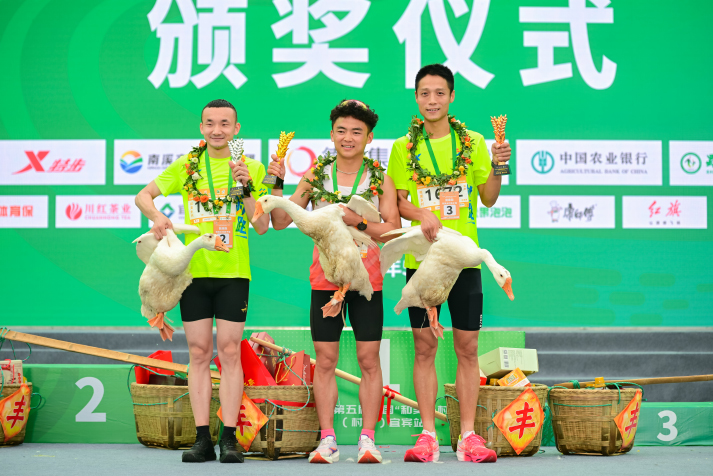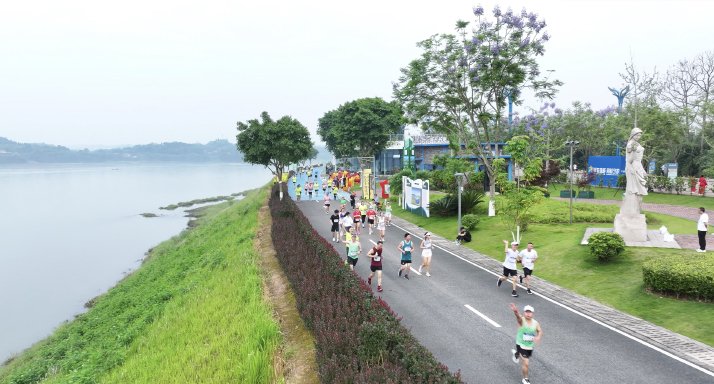
With its course set against a canvas of quaint villages on the one side and the majestic curve of the Yangtze River on the other, this rural half-marathon offered a laid-back atmosphere, attracting participants, many of whom were farmers, from across China.
As runners made their way through the scenic countryside, they were encouraged by cheerleaders dressed in ethnic costumes and got the chance to sample some local snacks along the route.
Unlike traditional races with cash prizes, the winners received a live goose and two baskets filled with local produce.
The event kicked off at 7:30 a.m. on May 19, with over 2,000 runners ready to go at the starting line, eager to tackle the 21.0975-km journey through Nanxi District on the outskirts of Yibin in Sichuan Province, southwest China. About four minutes later, another wave of over 1,000 participants set off on a shorter, 4.2-km run.
Launched in 2020 by the Ministry of Agriculture and Rural Affairs and the General Administration of Sport of China, this national-level event featuring running races in rural areas has been held annually at different locations all over China. This year, Yibin took the baton of hosting the opening races.
The participants generally comprise a mix of farmers, individuals working in agriculture-related fields, local residents and professional marathon runners.
Registration for the event opened on April 17 and was met with overwhelming enthusiasm, with 3,000 open slots filled up within just five minutes, the organizing committee told Beijing Review.
Relax, recharge
The starting line, also serving as the finish line, was situated near the first major bend of the Yangtze River in Yibin. This spot is the place where the Minjiang River, a tributary
of the Yangtze River, converges with the upper reaches of the Yangtze River, unveiling a 24-km panorama that sets the perfect backdrop for a half-marathon.
"This half-marathon offered a relaxing atmosphere," Meng Xianjuan, a participant from Hebei Province in north China, told Beijing Review. "Beyond the scenic vistas, the course featured gentle slopes and minimal sharp turns."
Meng, a 51-year-old running enthusiast who has participated in different marathons for over two years, noted how running in this rustic setting felt very different from running in the urban concrete jungle. "Unlike the modern skyscrapers seen in big cities, here, you're enveloped by lush greenery and blooming flowers," she said. "It's an ideal spot for running."
She arrived in Yibin two days before the race to prepare, and took advantage of the proximity of her hotel to several fruit-picking farms. "I went watermelon picking—given it's watermelon season," she said. "It was a unique experience after having run many city marathons."
According to the organizing committee, the participants hailed from 21 provinces, municipalities and autonomous regions across China. Some farmers had formed teams with their provincial counterparts to participate in the event. Beyond the competition, many runners considered this race an opportunity to showcase themselves and promote their agricultural products, adding a twist to the traditional athletic event.
Liu Yong from Chongqing Municipality enthusiastically waved a flag emblazoned with "Chongqing Citrus" throughout the race. "I live by the Yangtze River in Chongqing," he told news portal ThePaper.cn. "Chongqing's hilly terrain requires constant climbing, which has nurtured my passion for running. The roads in my hometown are lined by citrus trees and running under their shade is a regular enjoyment for me. I took this opportunity to promote the reputation of my hometown's citrus fruits."
He Fanyong, a farmer from Yibin's Pingshan County and a celebrated rural life vlogger with 1 million followers across different Chinese social media platforms, completed the race while carrying a batch of his hometown's specialty—fine dried noodles. Crossing the finish line, he immediately began promoting his noodles, not even stopping to wipe away his sweat. "Through my videos, I strive to present the most authentic and unfiltered aspects of rural life," he stated.
The event also served as a platform for local cheerleading squads from a range of ethnic backgrounds to exhibit their unique cultural traditions and skills. Performances featuring waist drums, lotus spears and flower boats contributed to the across-the-board cultural ambiance.
An exhibition area for the display and sale of Yibin's agricultural products and local handicrafts was set up next to the finishing line.
Thirty master craftsmen demonstrated their skills on-site, including bamboo weaving, embroidery, straw crafts, wax dyeing and sugar painting, offering a glimpse into the region's intangible cultural heritage.

More than a run
Deng Yi, a 56-year-old runner originally from Yibin but a longtime resident of Beijing, returned to Nanxi for the event after many years away. "When I was young, the villages along the Yangtze in Yibin were considered the most remote, but now the rural areas look even more appealing than the urban ones," he told Xinhua News Agency.
He considered the half-marathon an excellent opportunity for Yibin to showcase its picturesque countryside and promote local culture, sports, and tourism.
Deng underlined the culinary delights of the area, known as a foodie haven. Along the course of the half-marathon, especially in the last kilometer, local snacks were supplied to runners, including specialties such as dried tofu, dried goose meat, crayfish and rice cakes, to energize participants with a taste of local flavors.
Su Yuhao, a Beijing-based sports blogger who ran the 4.2-km race, was very interested in Yibin Wuliangye, a famous Chinese liquor on par with Moutai—a brand of baijiu ("clear liquor") that is considered a national treasure.
"Before going there, I wondered if we could enjoy as much Wuliangye as we like, similar to how runners of [France's] Bordeaux Marathon can enjoy unlimited wine," he said in a short video on Douyin, the Chinese version of TikTok, before embarking on the race.
To his delight, he discovered the liquor was available in the last km, with vendors allowing runners to take as much as they dared. "The vendors were all so enthusiastic," he exclaimed. "They kept putting snacks in my hands."
For Li Tangjie, a marathon enthusiast from Hubei Province, running marathons in different locations is an excellent way to explore new places. "There are always some fun discoveries," he told Xinhua. This time, he was charmed by the local marriage registration office in Nanxi District, which overlooks the Yangtze River. "Newlyweds take their vows facing the Yangtze, creating a beautiful scene," he said.
This year's rural marathon will expand to four more locations nationwide and Li hopes to continue exploring and experiencing the unique charm of China's countryside through running. "I will continue to participate in these running events as long as I can," he said.
(Print Edition Title: A Countryside Dash)
Copyedited by Elsbeth van Paridon
Comments to yuanyuan@cicgamericas.com